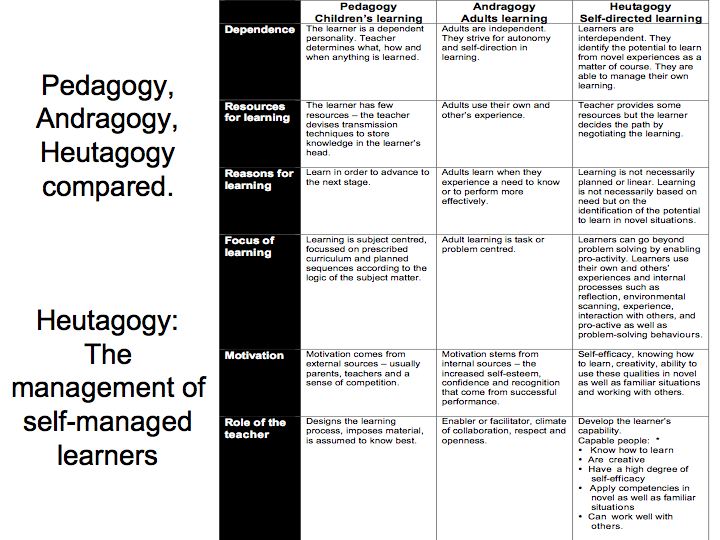
Ray Schroeder, founding director of the UPCEA National Council for Online Education, introduced a new term to me in this post: heutagogy.
First, he distinguishes andragogy (the teaching of adults) from pedagogy (the teaching of children) using Malcolm Knowles’ four principles of adult learning theory:
- Adults need to be involved in the planning and evaluation of their instruction.
- Experience (including mistakes) provides the basis for the learning activities.
- Adults are most interested in learning subjects that have immediate relevance and impact to their job or personal life.
- Adult learning is problem-centered rather than content-oriented.
He then differentiates heutagogy from andragogy by defining heutagogy as “a student-centric teaching and learning strategy where the learning is determined by the learner,” focusing on “enabling learners to define their own outcomes.”
Schroeder provides necessary additional detail to this student-centered approach to teaching and learning:
By letting go of rigid control of the learning, we respect our adult professionals to build and direct their own learning. Our role becomes one of encouragement and support including such techniques as Socratic questioning to help the students refine their learning experience.
This approach is uniquely applicable to the field of professional continuing education. It is how we will most effectively teach professionals.
Self-directed learning respects the motivation and competency of professionals seeking to improve and expand their knowledge and skills. It is especially effective online, using the plethora of Web-based resources and tools to enlighten and update the areas of study. We should encourage our faculty members and instructional designers to consider these effective approaches to teaching the adult, motivated and professional students.
As I read it, heutagogy represents one method of andragogy, focusing specifically on principle #1, that adults need to be involved in the planning and evaluation of their instruction. I don’t think I would distinguish it from andragogy; rather, I would place it on a spectrum of instructional principles that places a great deal of agency for learning in the hands of students.
Have you heard of heutagogy? It’s a new term to me, but a quick Google search reveals the Heutagogy Community of Practice, a useful table detailing distinctions between pedagogy, andragogy, and heutagogy (see below), a 2012 article in the International Review of Research in Open and Distributed Learning titled Heutagogy and Lifelong Learning: A Review of Heutagogical Practice and Self-Determined Learning, and plenty more.

Clearly the term is not new to everyone. It looks like the seminal article on heutagogy is this 2000 article by Stewart Hase and Chris Kenyon of Southern Cross University, “From Andragogy to Heutagogy” (follow the “Publisher version” button, then scroll to the hyperlinked article).
What do you think? Is there something here that SPCS should take and run with? Or is heutagogy better applied in asynchronous online learning settings like MOOCs? And what applications do you see available in your SPCS classes?